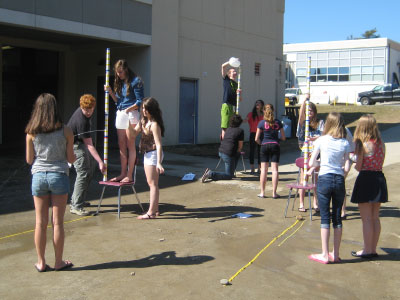Education: Webinars
In this two-part series, two educators share their experiences teaching earth science concepts to their students using
inquiry-based methods.
Dr. Susan Lozier (Professor, Duke University) discusses how our ability to construct knowledge about the ocean has evolved over time, primarily through the acquisition of satellite data.
Ted Taylor (High School science teacher) demonstrates how selected inquiry-based labs engage his students in the scientific process and help them develop the skills needed for future science courses.
Click here for our science webinars.


How Do We Teach Ocean Concepts in the High School Earth Science Classroom?
Presented by Ted Taylor – May 3, 2012
Are "cookbook" labs the best way to engage high school students in learning fundamental earth science concepts? Can real data
be used by high school questions to investigate research questions and put together the answers? A move towards inquiry-based
science education has shown that the latter is possible. In this webinar, Ted Taylor (Korea International School, Bangor High School)
gives us a peek inside his classroom to show us how it can be done.
Dr. Susan Lozier (Professor, Duke University) discusses how our ability to construct knowledge about the ocean has evolved over time, primarily through the acquisition of satellite data.
Ted Taylor (High School science teacher) demonstrates how selected inquiry-based labs engage his students in the scientific process and help them develop the skills needed for future science courses.
Click here for our science webinars.
Aquarius Inquiry Education Webinars

Using Aquarius Data: How is Inquiry-Driven Education Brought to the Undergraduate Classroom?
Presented by Dr. Susan Lozier – May 1, 2012
The concepts of salinity, density, circulation, temperature and other fundamental physical processes make up the core of any
marine science course. Teaching these topics in an undergraduate classroom can be challenging to any educator. This webinar
focuses on how our ability to construct knowledge about the ocean has evolved over time as the ocean becomes increasingly
accessible, primarily through the acquisition of satellite data. Dr. Susan Lozier of Duke University gives us a look into
her methods for getting students to ask questions and answer them with real ocean data.
Presented by Dr. Susan Lozier – May 1, 2012

How Do We Teach Ocean Concepts in the High School Earth Science Classroom?
Presented by Ted Taylor – May 3, 2012

